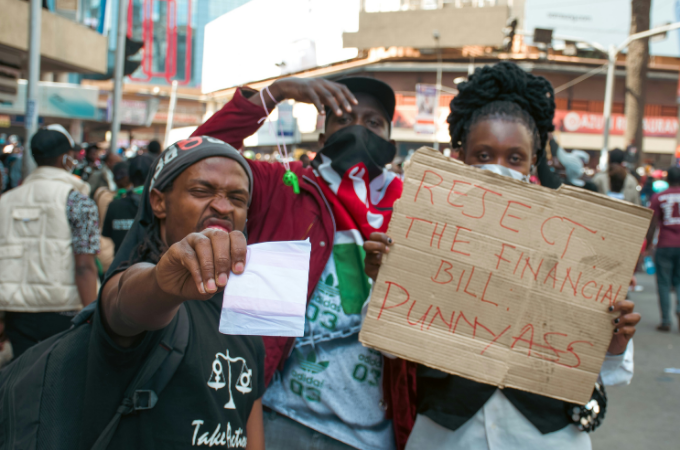
Nairobi, the capital city of Kenya, and other towns in the country have been a whirlwind of feelings over the past weeks. The streets, typically beating to the ebb and flow of daily life, have become those of defiant protests once or twice a week. The scent of tear gas and chanting protesters have been filling the air, demanding change. These protests were brought to life by the most controversial finance bill forwarded by the government, and it has set a fire under a generation of young Kenyans, myself included.
Young people have stood shoulder to shoulder in protests, our voices together creating a chorus of discontent on governance. At home, our mobile phones have become the weapon of choice. As you scroll through endless tweets, posts, and videos, there’s a growing surge of anger, the shared outrage, and determination to fight for a better future. But then there comes that time for reflection, and it is in this time that a sense of discomfort sets in. There’s a possibility of being drained, frightened, and pressured by the need to keep up with what is happening and to act.
We are a generation brought up in the digital age, where information is at our fingertips and our voices can reach other continents. Hundreds of young Kenyans have joined this drama unfolding before our eyes, whereby we are players and audience simultaneously. Social media’s virtual agora lets us debate, mobilize, and vent our frustrations. We have used the power of the internet to raise our voices, shouting out the message to our leaders for accountability.
The non-stop submergence in this digital space, however, comes at its cost: it affects our psyche. News comes in incessant waves, normally riddled with fairness and cruelty, exacting its mental cost. Studies have linked excessive social media use to increased anxiety, depression, and anger. People are more open to expressing their rage in these virtual spaces, in ways they perhaps wouldn’t face-to-face. This is what can create a kind of toxic environment where anger festers and really interesting dialogue becomes impossible.
So, what is anger, and why does it become such a force in social movements? Just so that we are on the same page, anger is an emotional response to some threat or injustice. It’s a rather archaic drive that can move us into the fight for what’s rightfully ours, to challenge the status quo, and to demand change. In the case of the Kenyan protests, anger is fanned by many factors, ranging from economic hardship to political corruption and being betrayed by those in power.
Proposed tax hikes and levies in the finance bill have been the trigger behind this outpouring of anger. For far too many young Kenyans, this is but a normal unfair burden that common citizens are forced to bear—a symbol of this insensitive government that is out of touch with the needs and aspirations of its people. There are rising levels of anger manifesting in various ways: peaceful protests, civil disobedience, and online expressions where #RejectFinanceBill2024 and #RutoMustGo have emerged as rallying cries for the movement.
While anger can be a very good drive, it is often destructive if it is not channelled properly. History is full of revolutions that then turn into violence and mayhem because anger was not controlled. The challenge for young Kenyans is to take this anger and turn it into a force of change. This balance is delicate between raising voices and having a meaningful conversation. It also calls for recognition of the psychological costs which activism can have and the need for self-care.
It’s about being able to navigate this really complex landscape, remembering that, in the words of Nelson Mandela himself, “Resentment is like drinking poison and then hoping it will kill your enemies.” Anger and resentment, if held within for too long, are only detrimental to us in the long run. We have to find ways in which we can channel our feelings into constructive action, be it through volunteering or organizing some community initiative, or just plain advocating for changes in policy.
We must remember that revolutions are not won in a day. Indeed, a worthwhile revolution requires much continuing effort, resilience, and readiness to adjust to new situations. But in order to keep up the fight, we have to take good care of our minds and emotions. This involves stepping away from social media and being with our families and close friends, participating in activities that give us joy and comfort.
The future ahead of us is uncertain. One thing, though, is very clear: the young people of Kenya will not be silenced. We will continue to raise our voices in both offline and online platforms until our demands are heard. Anger shall not consume us, but we shall use it as fuel to propel us toward a better future. What remains, then, is how we strike this delicate balance between activism and self-care, fighting for change while preserving our sanity. The answer lies in what I think is collective resilience, staunch determination, and a move to build a better Kenya for ourselves and generations to come.
Photo by Hassan Kibwana on Unsplash










COMMENTS -
Reader Interactions